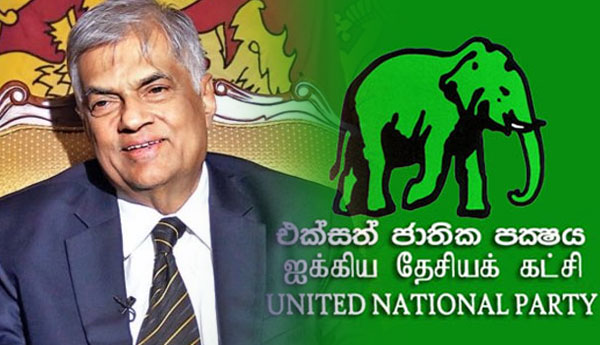President Ranil Wickremesinghe’s United National Party (UNP) has claimed its 250,000-vote mandate has effectively superseded the 6.9 million-vote mandate received by his predecessor Gotabaya Rajapaksa, amid speculation that sections of the Sri Lanka Podujana Peramuna (SLPP) are not as enamoured by Wickremesinghe as others in the ruling party.
UNP Chairman Vajira Abeywardena speaking at an event on Monday July 17 said what is being implemented at present is the “250,000 agreement” rather than the “6.9-million agreement”.
Abeywardena was ostensibly referring to the 6.9 million votes received by Rajapaksa at the 2019 presidential election and the paltry 249,435 votes received by the UNP at the 2020 parliamentary election, in which Sri Lanka’s ‘grand old party’ suffered its worst ever defeat. The once-mighty UNP managed to secure only one national list seat in parliament, now occupied by Abeywardena after party leader Wickremesinghe was elected president by parliament in July 2022 with overwhelming SLPP support.
One major reason for the UNP being routed at the 2020 poll was the mass exodus of UNP members at all levels to the newly formed Samagi Jana Balawegaya (SJB) led by former UNP deputy leader Sajith Premadasa who is now opposition leader.
“Raise your hands if you were in a petrol or cooking gas queue. Those of you who raised your hands are no longer in a queue, so give a round of applause to President Ranil Wickremesinghe with both your hands,” Abeywardena told his audience of UNP members, recalling the seemingly endless queues for essentials in 2022 during the country’s worst currency crisis in decades.
“What are we doing these days? Is it what the people approved? No. 6.9 million people approved one. Is that what’s being implemented now? No. We’re implementing the 250,000-vote agreement. That agreement is under way. That is the truth. You can’t continue to function on a lie.”
Rajapaksa in 2019 and the SLPP in 2020 both ran on a decidedly nationalist platform that had positioned itself as a counter to what their camp had deemed the UNP’s “neoliberal” agenda. The UNP’s pro-Western, pro-privatisation and generally small-government outlook provided ample fodder to the SLPP and its allies that were riding a wave of patriotism that had come in the wake of the 2019 Easter Sunday bombings.
However, following the financial crisis of 2022 which triggered massive protests resulting in the ouster of Rajapaksa and a change of government into a more fiscally-conservative and arguably “liberal” avatar of Rajapaksa’s SLPP government, the UNP’s “agenda” does seem to be at play, in complete contrast to the mandate secured by Rajapaksa in 2019. Consequent to Sri Lanka’s agreement with the International Monetary Fund (IMF), the restructuring of state-owned enterprises (SOEs) and a host of other reforms are now being implemented by an impossible and somewhat shaky but politically expedient alliance between Wickremesinghe and the SLPP.
Meanwhile, Premadasa’s SJB, which is now the main opposition, has been accused by its critics of embracing populism in the face of a slow rise in the president’s popularity, at least among the urban middle classes.
SJBMP Harsha de Silva himself has acknowledged this popularity.
“President Wickremesinghe may have gained some popularity in the last few months. I’m not going to take that away from him. But that doesn’t mean that the UNP has gained anything significant,” said de Silva, speaking to EconomyNext on June 28.
The SJB on July 04 rebuffed another invitation from President Wickremesinghe to work together with his administration, demanding instead that he dissolve parliament soon.
SLPP stalwart Mahindananda Aluthgamage meanwhile told reporters on July 09 that Wickremesinghe has not indicated any intention to dissolve parliament yet. The SLPP has also decided to support President Wickremesinghe over the next two years, he said, amid speculation that there is division within the party over continued support for the president.
“As a party, we have decided to support the president in the next two years to rebuild this country,” said Aluthgamage.
The MP, who was Agriculture Minister in ex-President Gotabaya Rajapaksa’s cabinet, said the party made the best decision available to them at the time when it decided to back Wickremesinghe’s bid for the presidency in 2022.
Aluthgamage’s comment comes amid reports that a number of SLPP seniors are disappointed that cabinet positions continue to evade them. This is in addition to at least two prominent members of the party being absent from a crucial parliamentary vote on Sri Lanka’s domestic debt restructuring (DDR) programme.
Meanwhile, Wickremesinghe’s UNP seems quietly confident of a return to form after being nearly annihilated at the last parliamentary election in 2020.
UNP assistant leader Akila Viraj Kariyawasam told a gathering on July 09 that political parties will rally behind Wickremsinghe as part of a UNP-led coalition.
“The dark curse that had fallen on the country is gradually being lifted. Political parties are not coming as one party anymore. They’ll be a UNP-led party,” he said.
Kariyawasam had previously said that Sri Lanka’s next election will likely be a presidential poll, which is due in November 2024, though an early presidential poll has not been ruled out.
Main opposition Samagi Jana Balawegaya (SJB) leader Sajith Premadasa has already welcomed an early presidential election. Premadasa told the SJB Working Committee on May 16 that he intends to form an SJB-led alliance of opposition parties in the event of an early presidential poll, which will require a constitutional amendment.
The SLPP, meanwhile, has seen some fragmentation since the ouster of former president Rajapaksa, with these splinter groups largely ready to throw its weight behind opposition leader Sajith Premadasa.
Dilan Perera, a member of one of the SLPP’s breakaway factions said in June that Sri Lanka’s opposition parties must rally behind a leader they can all agree to support at a future presidential election with the next favourite agreeing to be prime minister in a common workable arrangement.


